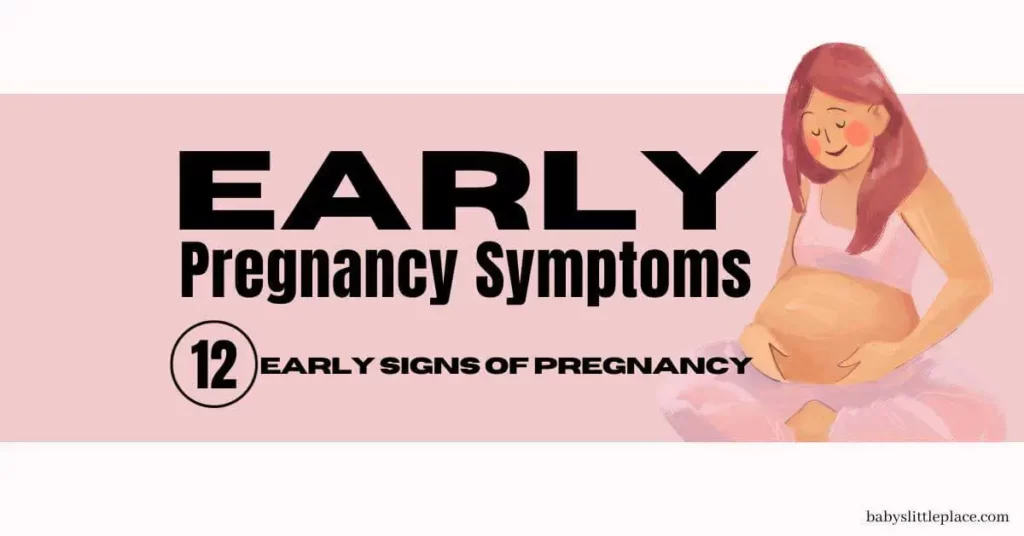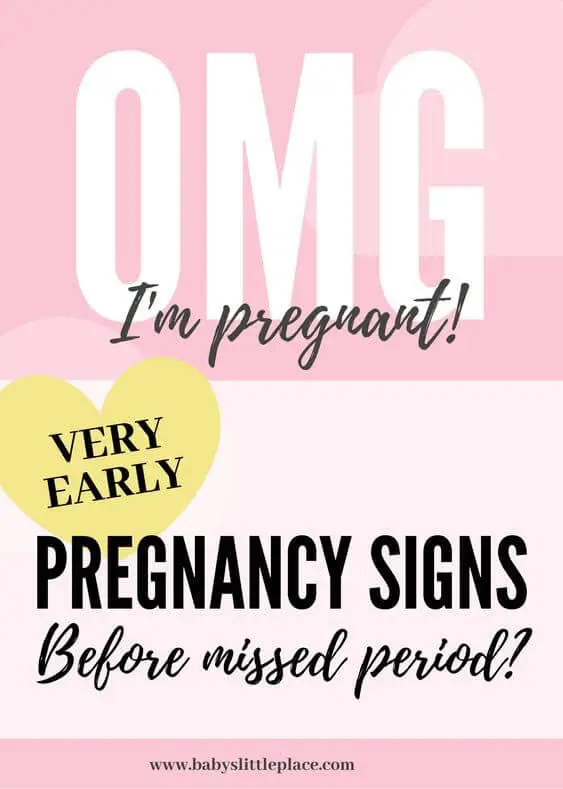Curious if you’re pregnant? The best way to find out is by taking a pregnancy test. Yet, some early signs might give you a hint beforehand. From feeling sick to being extra tired, learn what early pregnancy symptoms are.

During early pregnancy, your body goes through significant hormonal changes, sparking various signs. These symptoms can differ for each person and each pregnancy.
Some women notice changes in their body before realizing they’re pregnant, while others might have very subtle or even no symptoms at first. Actually, women in early pregnancy are pretty often examined for bladder or gastric inflammation, as they do not suspect the pregnancy.
Common signs of early pregnancy include a missed period, frequent urination, breast tenderness, fatigue, and morning sickness (nausea and vomiting). Early pregnancy symptoms also vary in intensity, frequency, and duration.
Yet, these signs could also arise from other causes. You have to remember that what are early pregnancy symptoms for one woman can be only premenstrual discomfort for another. So, if pregnancy is suspected, taking a home test or consulting your GP is wise.
Does Every Woman Get Early Symptoms of Pregnancy?
Not necessarily! Every individual is unique, and so are their pregnancy experiences. Early pregnancy symptoms can vary widely among different women and can even differ from one pregnancy to another for the same person. It’s normal for these experiences not to align, and the absence of early symptoms doesn’t automatically signal an issue.
Let’s delve into some typical early pregnancy symptoms. Keep in mind these signs can also arise from reasons other than pregnancy. So, if you notice these symptoms, it doesn’t definitively confirm your pregnancy. The most accurate way to confirm pregnancy is through a pregnancy test.
Early Pregnancy Symptoms
It’s crucial not to compare your pregnancy with someone else’s, as symptoms can wildly differ between individuals.
Let’s explore some general early pregnancy signs, but keep in mind these may not apply to you, at least not all of them.
Classic Early Signs and Symptoms of Pregnancy
- Missed period
- Morning sickness
- Tender, swollen breasts
- Mood swings
- Fatigue
- Frequent toilet visits
- Food aversions or cravings
1. Missed period, an obvious pregnancy sign:
A missed period is the most common and obvious early pregnancy sign. However, it is important to note that a missed period does not necessarily mean you are pregnant. Stress, intense workouts, changes in diet, hormonal imbalances, and various other factors can also disrupt your menstrual cycle, leading to missed periods.
Nevertheless, a missed period is often the first indication that prompts women to suspect pregnancy and look for other early pregnancy symptoms. You may not experience any other pregnancy signs until you notice that you have missed your monthly cycle.
2. Morning sickness, an unpleasant symptom of pregnancy:
Morning sickness affects over half of expectant mothers, showing up as feelings of nausea, vomiting, and a loss of appetite. Despite the name, it can strike at any time of day, not just in the morning.
Morning sickness can start as early as two weeks into pregnancy but commonly begins between the fourth and sixth week, easing around week 12. However, some experience it longer or later in pregnancy, around week 32.
While the exact cause isn’t known, hormonal changes likely trigger this discomfort. Typically, it’s a normal part of pregnancy, but in severe cases, it can cause dehydration due to the inability to keep food and fluids down. If extreme nausea and dehydration are an issue, contacting a healthcare provider is crucial.
3. Tender, swollen breasts:
In the early stages of pregnancy, your breasts can go through some changes. They might feel more sensitive when touched, kind of like how they do before your period, but a bit more intense. The area around your nipple, called the areola, might darken and get bigger too.
Don’t worry, the tenderness doesn’t stick around forever. As your body adjusts to all those new hormones, it tends to fade away. Oh, and you might notice your breasts getting bigger, which could mean you need a new, slightly bigger bra.
4. Changes in hormone balance cause mood swings:
Mood swings are common, especially during the first trimester. They are caused by hormonal changes that influence chemicals in the brain. Excessive irritability, feelings of massive joy, from joy to crying, from the sun to rain, all of these is common in early pregnancy.
However, 1 in 10 women experience depression during pregnancy. Depression is treatable, so if you are feeling depressed or ‘down’ during pregnancy, it is crucial to get help early. Please contact your GP, midwife, or maternal and child health nurse as soon as possible.
5. Feeling tired:
Experiencing tiredness is a common early symptom of pregnancy. This may be due to a sudden increase in a hormone called progesterone, which is necessary for maintaining the pregnancy and supporting the growth of the baby. However, progesterone also has a slowing effect on your metabolism, which can lead to fatigue.
Fatigue during pregnancy can also be caused by anemia, which is typically the result of an iron deficiency. Consuming foods that are rich in iron is crucial in preventing iron deficiency anemia during pregnancy.
The good news is that fatigue typically subsides during the second trimester, around week 13. Unfortunately, many pregnant women experience a resurgence of fatigue in the final stage of pregnancy, the third trimester.
6. Frequent toilet visits:
When you are pregnant, you may feel the need to urinate more frequently than usual. This is due to increased fluid accumulation in your body, which causes your kidneys to work harder than usual.
Additionally, as your belly grows, it puts pressure on your bladder, resulting in more frequent bathroom trips.
It is very common for women to experience this in the first few weeks of pregnancy.
7. Food aversions and cravings:
During early pregnancy, you may find that the food you normally enjoy is no longer appealing. For example, I love pizza, but during the first two months of my pregnancy, I couldn’t even stand the sight or smell of it, let alone eat it.
On the other hand, you may start craving foods that you don’t usually like or even develop a liking for odd food combinations. Cravings for certain foods are quite common during pregnancy, especially for those that offer energy and calcium.
In some cases, pregnant women may even develop an unusual taste for non-food items like soil or paper. This is known as ‘pica‘ and may indicate a deficiency in nutrients. If you experience such cravings, please speak to your GP or midwife.
RELATED: Pregnancy diet for the 1st trimester
Other signs and symptoms of pregnancy
- Digestive problems
- Light spotting and vaginal discharge
- Headaches
- Faintness and dizziness
- Heartburn
1. Digestive problems:
Many pregnant women experience digestive problems throughout their pregnancy, not just in the early stages. The most common issues are bloating and constipation.
The hormonal changes in your body, particularly the high levels of progesterone, result in your digestive system slowing down, which leads to constipation.
To alleviate this problem, you should drink plenty of water, consume probiotics and high-fiber foods, and engage in gentle, low-impact exercises such as swimming, walking, or yoga.
It’s important not to take over-the-counter laxatives without consulting your midwife or GP first. In case changes to your diet and lifestyle don’t help, your GP or midwife can prescribe a safe laxative to use during pregnancy.
RELATED: Probiotics during pregnancy
2. Light spotting and vaginal discharge:
These are two common changes that can occur during pregnancy. Light spotting, also known as implantation bleeding, can be one of the early signs of pregnancy. It occurs when the fertilized egg attaches to the uterus lining, typically around 10 to 14 days after conception. However, not all women experience it.
On the other hand, an increase in vaginal discharge is a normal occurrence during the whole pregnancy, not just at the beginning. However, it may also indicate an infection if the discharge is accompanied by itchiness, pain, a bad odor, or pain while urinating. In such cases, seeking medical attention from your GP is essential.
3. Hormonal changes in early pregnancy often cause a headache:
Hormonal changes in early pregnancy increase blood circulation. This can sometimes result in mild headaches.
If you experience a headache during pregnancy that is not relieved by paracetamol, especially after the first half of your pregnancy, it is important to contact your GP or midwife.
A persistent headache can be a sign of pre-eclampsia – a condition that affects your kidneys, leading to an increase in blood pressure and a decrease in blood flow to your baby.
4. Faintness and dizziness:
Because of the hormonal changes, blood vessels dilate, so your blood pressure drops. That can cause lightheaded or dizziness.
5. Heartburn:
Heartburn is a common condition during pregnancy. It is described by a burning sensation in the chest or throat. It appears due to many changes that happen in your body during pregnancy.

Frequently Asked Questions about Early Pregnancy Symptoms
When Can I Expect Pregnancy Symptoms Before Missing My Period?
You might notice typical early pregnancy signs just days after conception, which is roughly a week and a half before your anticipated period.
Can I Determine Pregnancy After the First Week?
It’s tough to be certain about pregnancy after just one week. However, if you start experiencing one or more early pregnancy symptoms, it’s possible you could be pregnant.
How Can I Confirm Pregnancy?
The absence of your period is a reliable sign, but it’s not a surefire indication. The simplest way to confirm pregnancy is by taking a test that detects the hormone produced by a fertilized egg.
You can do this test at home since there are plenty of pregnancy tests available in the market. These tests often claim to be 99 percent accurate, but it’s important to know that this isn’t foolproof. Even if conducted by an experienced lab technician in a laboratory, it can still yield false positives or negatives.
The only 100% guarantee of pregnancy confirmation comes from a gynecologist performing an ultrasound examination.
Please Keep in Mind the following information about Early Pregnancy Symptoms
When it comes to having a baby, each person’s experience is unique. However, there are some early signs of pregnancy that you should be aware of. These may include missing your period, spotting or cramping, fatigue, mood swings, nausea, and more. If you suspect that you may be pregnant, take a test and consult with a doctor.
If you are pregnant, I hope you have a pleasant pregnancy with minimal complications! Although pregnancy symptoms can be challenging at times, it is still one of the most enjoyable periods of your life.
Our website contains many useful articles about pregnancy. Our team also reviews numerous baby cribs, crib mattresses, and other baby gear to help you provide the safest sleeping environment for your little one.
